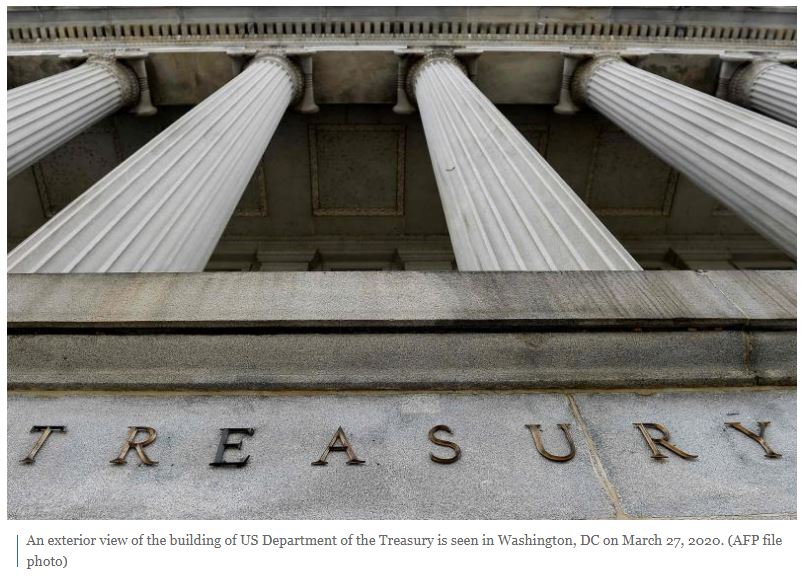Thailand among countries at risk in US Treasury’s currency report
WASHINGTON: Thailand is among several countries the US Treasury could label currency manipulators before President Donald Trump leaves office, analysts say, as the coronavirus pandemic skews trade flows and widens US deficits with trading partners.
Currency experts say Vietnam, Taiwan and Switzerland also risk being found in violation of the three US criteria for currency manipulation in the Treasury Department’s long-delayed report on the foreign exchange practices of major trading partners. They expect the report within days.
While President-elect Joe Biden is expected to be less confrontational with US allies on matters of trade, a new White House could find it politically difficult to immediately walk back designations of currency manipulation by the current administration.
To be labelled a manipulator, countries must at least have a $20 billion-plus bilateral trade surplus with the United States, foreign currency intervention exceeding 2% of GDP and a global current account surplus exceeding 2% of GDP.
Brad Setser, a former US Treasury economist and senior fellow at the Council on Foreign Relations, has replicated data used by Treasury to analyse these criteria, constructing a quarterly tracker that shows Vietnam, Switzerland and Thailand exceeded the department’s thresholds during the first and second quarters of 2020.
Taiwan met all three thresholds in the second quarter, but barely missed on the foreign exchange intervention in the first quarter in the data compiled by Setser, who now serves on Biden’s transition team for trade issues.
However, Treasury’s actual data may differ and it has some discretion in applying the label, and mitigating circumstances such as the coronavirus pandemic may factor into its decisions.
Trade surpluses for Asian economies exporting personal protective equipment and other supplies needed to fight the pandemic have jumped, while capital has surged into safe haven currencies such as the Swiss franc, driving them higher.
The Swiss National Bank has spent 90 billion francs (3 trillion baht) to tame the franc’s rise in the first half of 2020, putting it squarely in the Treasury’s focus.
The Treasury has often treated Switzerland differently because it views Switzerland’s intervention as not trade-driven, but that could change this time, said Mark Sobel, another former Treasury and International Monetary Fund official.
“If the Treasury is going to go after a few Asian countries and Switzerland trips all three criteria, how do you not go after them?” said Sobel, now with the Official Monetary and Financial Institutions Forum think-tank.
Vietnam targeted
Vietnam’s currency practices have been in the Trump administration’s crosshairs for months, as the US Trade Representative’s office investigates the undervaluation of the dong.
Business groups are concerned the administration could make moves, such as punitive tariffs, on these soon.
The Treasury already declared Vietnam’s currency undervalued by 4.7% in 2019 in a Commerce Department anti-subsidy case, which led to punitive duties on Vietnamese light vehicle tire imports.
Taiwan, like Vietnam, has seen its trade surplus with the United States grow as companies moved supply chains from China to these countries in response to US tariffs on Chinese goods. Taiwan spent $3.9 billion buy US dollars in the first half of 2020, to tame a 5% rise in the Taiwan dollar against the greenback, exceeding its 2019 purchases.
China, declared a manipulator in August 2019 at the height of US-China trade tensions, has been a fixture on Treasury’s monitoring list for years due to its massive trade surplus with the United States. Treasury removed the label in January as the two countries signed a “Phase 1” trade deal and China’s foreign exchange interventions and global current account surplus remain below the thresholds.
Win Thin, global head of currency strategy at BBH in New York downplayed the report as “totally politicised” under Trump.
“Any sort of move this current Treasury secretary makes can be easily reversed when the new Treasury secretary comes in,” Thin said.
There is no automatic punishment with a currency manipulator label, though US law requires Washington to demand negotiations with designated countries.
Source: https://www.bangkokpost.com/business/2036339/thailand-among-countries-at-risk-in-us-treasurys-currency-report


 English
English




